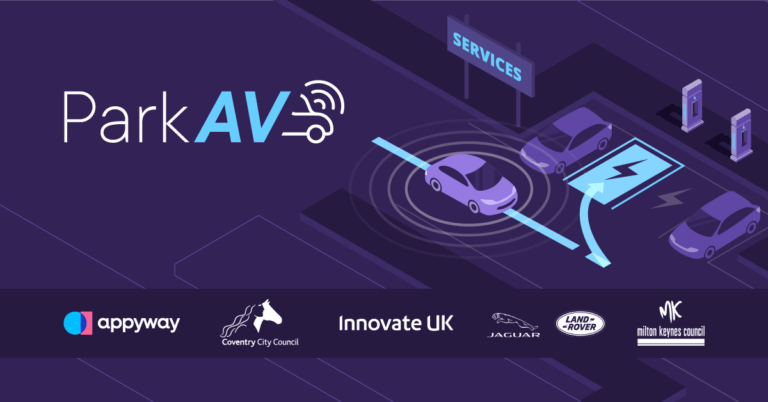The development of automated valet parking is vital to the commercialisation of Level 4/5 connected and autonomous vehicles (CAVs) in cities, a UK research consortium has said.
According to the Innovate UK funded ParkAV project, the introduction of automated valet parking could help cities, urban areas, traffic and highways planners to ensure empty CAVs do not contribute to traffic and congestion.
Made up of Coventry City Council, Milton Keynes Council, parking app developer AppyWay, automotive OEM Jaguar Land Rover and managed by WhiteWillow Consulting, the consortium aims to solve issues regarded as core for the successful introduction of CAVs.
These include where CAVs will go to drop off passengers, how they park between trips to recharge, access storage, or be serviced, and blend the relationship between on and off-street parking to support Mobility-as-a-Service (MaaS) operators.
Sunil Budheo, innovation manager at Coventry City Council, said: “When thinking about what our constituents might expect in the future with the rise of CAVs, it’s important to focus on not only optimising the user experience but also making sure the needs of the city are considered.

“Drop-offs and pick-ups for CAV journeys are likely to be on-street and close to points of interest, so both on-street and nearby off-street parking locations need to be part of our thinking.
“We must mitigate the circulation of empty vehicles on our streets.”
The ParkAV project has suggested that “developing a scalable and sustainable framework to see automated valet parking become commonplace and monetised requires a deeper public and private sector collaboration”.
As such, the group has identified what it describes as “baseline requirements and considerations across four key areas”:
– User experience: what do consumers/passengers want and expect?
– Commercial model: how are all parties active within an automated valet parking session compensated? How will the market opportunity be unlocked to enable scale?
– Integration: how do the physical and digital realms integrate across on and off-street infrastructure? How do cleaning and valet services access vehicles.
– Local government integration: off-street parking works best when it compliments on-street provision and supports local transport and traffic policies. Solutions that support both are important requirements for the mobility-as-a-service marketplace.
According to Ben Boutcher-West, head of mobility for AppyWay, a key deliverable within the project has been a detailed framework for both the flow of data and the flow of money to ensure automated valet parking is viable solution.
“Beyond just the vehicle technology, automated valet parking looks to deliver the function within a mobility subscription, one that manages topics such as Value Added Tax, all suppliers and even EV payment, in one technical and commercial interface,” said Boutcher-West.
Furthermore, the consortium said it believes a concept it has coined MaaSpark (i.e. dynamic kerbside access and integrated payments) is required to scale the rollout of shared, connected and one-day autonomous vehicles and to improve parking for all road users.
Based on current findings, the ParkAV project suggests the following to central government:
– Change the Road Traffic Act to allow short term parking in bays dedicated for other users and allow dynamic payment / reservation of parking bays;
– Allow digital and dynamic Traffic Regulation Orders (TROs) captured from roadside data to enable digital coverage for the whole UK. Within this, rename TRO to Mobility Enabling Order to emphasise the change in thinking;
– Mandate standards that support interoperability from parking payment systems;
– Have a customer and business centric view of how CAVs influence land use and development planning to encourage adaptability of land use and growth with a technology agnostic approach.
For local government, the ParkAV project suggests:
– Develop new approaches to more open parking contracts, based on outcome based key performance indicators with more risk taken by the contractor;
– See MaaSpark as an important enabler of MaaS, rather than a competitor/ blocker to it;
– Develop ways to charge wholesale prices for parking by changing contract approaches;
– Consider and plan now for future AV parking within new developments, allowing for future change of use.
Brian Matthews, head of transport innovation at Milton Keynes Council, added: “ParkAV gives us the opportunity to understand how this technology can be best applied in city environments, maximising the benefits for travellers and cities.”
Want to read similar stories?
London Gatwick Airport to trial robotic car parking
HumanDrive completes UK’s longest autonomous car journey
UK consortium launches autonomous EV platform
VW announces mobile charging robot concept
World’s largest robotic carpark installed in Florida apartment block
US DOT grants first-ever autonomous vehicle exemption
 Want to learn more about issues, concepts and technologies that are changing the way in which people and goods move around urban environments safely, cleanly and efficiently? CiTTi Exhibition 2020 takes place on the 3rd and 4th of November at Coventry’s Ricoh Arena. Register your interest to attend at www.cittiexhibition.co.uk.
Want to learn more about issues, concepts and technologies that are changing the way in which people and goods move around urban environments safely, cleanly and efficiently? CiTTi Exhibition 2020 takes place on the 3rd and 4th of November at Coventry’s Ricoh Arena. Register your interest to attend at www.cittiexhibition.co.uk.





